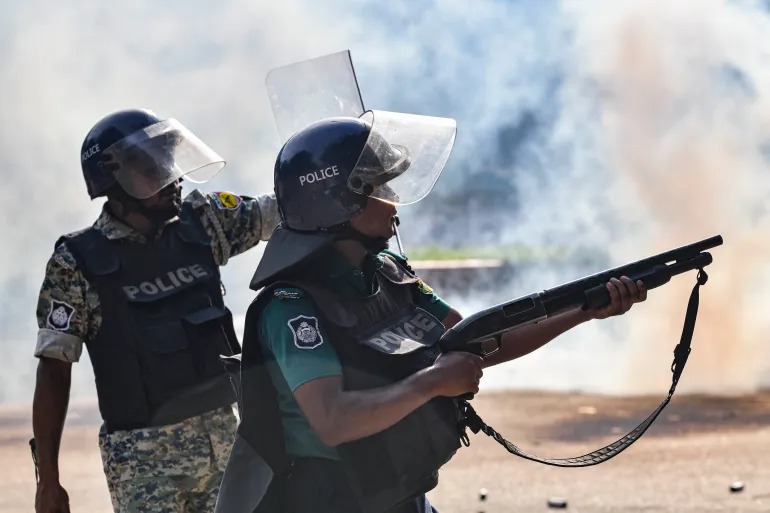- 09:25Venezuela Appoints Alex Saab as New Industry Minister Amid Political Turmoil
- 09:12Morocco's Diplomatic Reshuffle: King Mohammed VI Appoints New Ambassadors in Strategic Move
- 09:04X Social Media to Share User Data for AI Training: A New Era of Data Monetization
- 08:33Morocco's Planning Commission Sees Leadership Change as King Appoints New High Commissioner
- 21:10Al Omrane Expo for Moroccans Worldwide Makes a Stop in Amsterdam: Strengthening Ties with the Diaspora
- 17:45Diplomatic Engagement: Britain and China Seek Common Ground Amidst Tensions
- 17:20Morocco's Rural Education Overhaul: EIB, EU, and Government Launch €125.8 Million Initiative
- 17:05Hamas has announced that its leader, Yahya Sinwar, was killed in fighting with the Israeli army in Gaza
- 16:40Pregnant Teen's Rescue from Abandoned Well Uncovers Disturbing Allegations in Morocco
Follow us on Facebook
Bangladesh Grapples with Student Unrest: Mobile Internet Suspended Amid Intensifying Job Quota Protests
In a dramatic escalation of ongoing civil unrest, Bangladesh has taken the unprecedented step of suspending mobile internet services across much of the country. This move comes as student protests over government job quotas continue to intensify, with violent clashes between demonstrators and authorities resulting in casualties and widespread disruption.
The nationwide protests, which have claimed at least nine lives and left over 500 injured this week, showed no signs of abating on Thursday. Zunaid Ahmed Palak, the junior information technology minister, justified the internet suspension as a response to "various rumors" and an "unstable situation" proliferating on social media platforms. This digital blackout follows a previous restriction on Facebook access, which protesters had been using as a primary organizing tool.
The unrest has its roots in a contentious quota system for government jobs, which students claim unfairly favors supporters of Prime Minister Sheikh Hasina's Awami League party. Under the current system, a third of government positions are reserved for family members of veterans who fought for Bangladesh's independence from Pakistan in 1971. Protesters are demanding a merit-based system, citing high youth unemployment as a driving factor behind their discontent.
The situation on the ground remains volatile, with police deploying tear gas against protesters in various locations, including near BRAC University in Dhaka and on a main highway in Chittagong. The opposition Bangladesh Nationalist Party (BNP) has thrown its support behind the students, leading to police raids on the party's headquarters.

The government's response has been multifaceted. All public and private universities have been closed indefinitely, and riot police and paramilitary forces have been deployed to campuses. Prime Minister Hasina has promised to establish a judicial panel to investigate the deaths and bring those responsible to justice. However, her appeal for patience until a Supreme Court verdict on the quota system next month has done little to quell the unrest.
Law Minister Anisul Huq has extended an olive branch, expressing the government's willingness to engage in discussions with the protesters. However, the use of force against students has been described as "unprecedented" by observers, raising concerns about the potential for further escalation.
The international community has taken notice, with the U.S. and Indian embassies in Dhaka issuing advisories to their citizens. Rights groups, including Amnesty International, along with the United Nations, have called on Bangladesh to protect peaceful protesters from violence.
As the situation unfolds, questions arise about the long-term implications of these protests for Bangladesh's political landscape and its approach to addressing youth unemployment and social inequality. The government's handling of this crisis may well shape the country's trajectory in the coming months and years.
With tensions running high and no immediate resolution in sight, all eyes remain on Bangladesh as it navigates this complex and volatile situation. The coming days will be crucial in determining whether dialogue and compromise can prevail over confrontation and unrest in this South Asian nation.



